Q&A: Jérôme Sans
Jérôme Sans, curator, critic, musician and Le Méridien cultural curator
Jérôme Sans is a curator, cultural agitator, critic, musician and pioneer of contemporary art. He co-founded the acclaimed contemporary art institution Palais de Tokyo in Paris in 1999 and later worked in cultural programming at the Baltic Centre in the UK and the Ullens Center of Contemporary Art in Beijing. Sans is Le Méridien’s cultural curator and together with the hotel group founded the LM100™ programme, for which he identifies and enrolls new members who can advise Le Méridien on interesting combinations of the arts, design, music and cuisine. He aims to introduce interactive cultural experiences into the hotels as a way of life for the guests and associates of Le Méridien. We spoke to him during the buzz of activities around the official launch of the Le Méridien Istanbul Etiler in May 2012.
Wallpaper*: How did this cultural collaboration with Le Méridien come about?
Jérôme Sans: It started six years ago when I was just finishing my mission at the Palais de Tokyo in Paris. The CEO at Le Méridien at the time came to me and expressed her desire to collaborate with someone like me. I was very surprised that a global hotel group was approaching a curator. I told her immediately that I was not a corporate person. Of course, I travel all over the world as a curator, but my experience of hotels is from the view of a guest. So I said I would be delighted to collaborate with them, but I was not a decorator and I was not corporate. She confirmed that she was not looking for that, but for someone to help her reshape the brand. My work was to look for different creators – chefs, designers, sound artists, composers, scent designers – who could invent interdisciplinary experiences that would appeal to all the senses.
W*: What was the first step in the process?
JS: Our first effort was for a new Le Méridien hotel in San Francisco in 2006. The building was in a neighborhood where all the buildings looked like each other, with no vitality or life. We proposed transforming the façade into something people could interact with, something visual. At every level, half of the windows were lit in a primary colour. When entering their room, guests turned on the light and were treated to this colour, almost like a video animation. This was a collaboration with the artist Thierry Dreyfus and it was very successful. All of a sudden everyone was looking at the building where before they were not.
W*: What is Le Méridien’s approach in your programmes, such as LM100™, LM Hub and Arrival Experience?
Wallpaper* Newsletter
Receive our daily digest of inspiration, escapism and design stories from around the world direct to your inbox
JS: I found Le Méridien was interested from a pedagogical point of view. As a company, it is not afraid to take you outside the box, to make you learn something. We are in a period where culture is not a luxury. There is a social and cultural responsibility the brand has for their employees and for their guests. How can they be helped to grow not just financially or socially, but also intellectually and in their souls, to learn something everyday? The world is bigger if you have some knowledge.
W*: Can you describe some of the features of the cultural activities at Le Méridien hotels around the world?
JS: To make the hotel experience a little more exciting, we decided to have electronic key cards designed by artists, which were collectible items. Every six months we do a new set especially for Le Méridien guests. You can learn about the artist on Le Méridien’s website and watch a movie which gives an introduction to the artist’s work and vocabulary. And these cards also act as free passes to another cultural experience in the city. In each city where there is a Le Méridien hotel we have chosen a cultural partner. Here in Istanbul, it is the Istanbul Modern. At Le Méridien hotels around the world so far, music programmes have been installed, scents have been created and lobbies have been reimagined around specially commissioned works of art.
W*: What is happening in Istanbul at the launch of Le Méridien Istanbul Etiler?
JS: We understood the importance of the hotel here. Istanbul is booming; it is a key city in this part of the world. So we were very excited to make Le Méridien Istanbul Etiler a flagship for all of our cultural activities. We chose to work with Istanbul artists :mentalKLINIK, a LM100™ member. I first saw their work in Hong Kong. It is initially very pleasing to the eye, formal and literal, but also very abrasive. They play with art history, our visual knowledge of art, but they also play with the everyday, with the reality of things. I like the connection they make between art, design and architecture. They have produced a glass artwork for the lobby that is about fragility. Also with :mentalKLINIK, we collaborated on a special coffee cup with illy to mark the launch of the hotel. We have been working with Illy for quite awhile, but this is the first time it has made a one-off cup for a special event.
W*: What are the other artistic features here at Le Méridien Istanbul Etiler?
JS: The whole art programme, bringing in artists from all over the world, is in the lobby: there is an installation by the Chinese artist An Xiaotong and paintings by Mustafa Hulusi and Haluk Akakçe, among others. If you just walk through the lobby, you don’t necessarily see that this is art. But if you look properly, you will see that something is happening here, the energy, the dynamics of things, the presence. All of these artworks make the complete experience of moving through this lobby something unique. It is a voyage through different artistic experiences because it is not a normal experience of art. Here you have to walk through the art, like Alice in Wonderland, you have to go through the mirror, in a three-dimensional sequence. The artworks create a dialogue with the architecture and design of the hotel. We tried to speak about the new Istanbul not the old Istanbul. We tried to avoid clichés of the city. We preferred to hone in on the new protagonists in Istanbul like :mentalKLINIK. We did this to show visitors this side of the Turkey, in which a dynamic new generation is part of a global discourse.
Melina Keays is the entertaining director of Wallpaper*. She has been part of the brand since the magazine’s launch in 1996, and is responsible for entertaining content across the print and digital platforms, and for Wallpaper’s creative agency Bespoke. A native Londoner, Melina takes inspiration from the whole spectrum of art and design – including film, literature, and fashion. Her work for the brand involves curating content, writing, and creative direction – conceiving luxury interior landscapes with a focus on food, drinks, and entertaining in all its forms
-
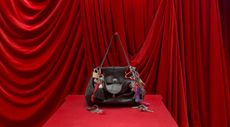 The moments fashion met art at the 60th Venice Biennale
The moments fashion met art at the 60th Venice BiennaleThe best fashion moments at the 2024 Venice Biennale, with happenings from Dior, Golden Goose, Balenciaga, Burberry and more
By Jack Moss Published
-
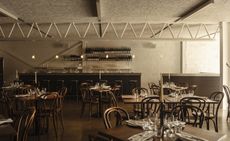 Crispin at Studio Voltaire, in Clapham, is a feast for all the senses
Crispin at Studio Voltaire, in Clapham, is a feast for all the sensesNew restaurant Crispin at Studio Voltaire is the latest opening from the brains behind Bistro Freddie and Bar Crispin, with interiors by Jermaine Gallagher
By Billie Brand Published
-
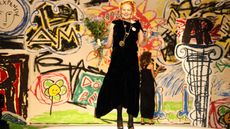 Vivienne Westwood’s personal wardrobe goes up for sale in landmark Christie’s auction
Vivienne Westwood’s personal wardrobe goes up for sale in landmark Christie’s auctionThe proceeds of ’Vivienne Westwood: The Personal Collection’, running this June, will go to the charitable causes she championed during her lifetime
By Jack Moss Published
-
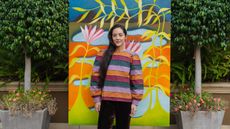 Four Seasons taps Camilla Engstrom to create artful acts of kindness
Four Seasons taps Camilla Engstrom to create artful acts of kindnessCamilla Engstrom talks about interpreting World Kindness Day through commissioned artworks
By Sofia de la Cruz Published
-
 Airbnb is reshaping itself for a fast-changing future
Airbnb is reshaping itself for a fast-changing futureAirbnb co-founder Brian Chesky on a ‘huge travel rebound’ and the company’s ‘150 upgrades and innovations’ in the face of a changing world
By Jonathan Bell Last updated
-
 A tribute to Arne Sorenson (1958 – 2021)
A tribute to Arne Sorenson (1958 – 2021)Arne Sorenson, who for the past decade ran Marriott International, the world's biggest hotel company, with brands including Edition, Ritz-Carlton, St Regis and Marriott, has died. His last major magazine interview was in Wallpaper's October 2019 Issue (W*247), with his friend and Edition collaborator Ian Schrager. We republish it here in tribute
By John Arlidge Last updated
-
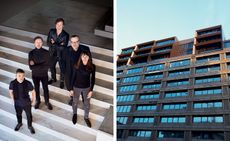 A daredevil hotelier and crack team of creatives are burnishing Brunkebergstorg’s brutal beauty
A daredevil hotelier and crack team of creatives are burnishing Brunkebergstorg’s brutal beautyBy Emma O'Kelly Last updated
-
 Inside Soho House’s new outposts: Nick Jones Q&A
Inside Soho House’s new outposts: Nick Jones Q&ABy Malaika Byng Last updated
-
 Q&A with Joe Ferry, Head designer, Virgin Atlantic
Q&A with Joe Ferry, Head designer, Virgin AtlanticBy Melina Keays Last updated
-
 Jerome Sans, Q&A
Jerome Sans, Q&ABy Melina Keays Last updated
-
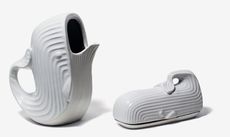 W Hotels: Jonathan Adler Q&A
W Hotels: Jonathan Adler Q&ABy Melina Keays Last updated